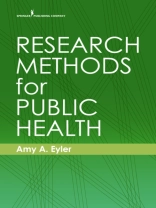Note to Readers: Publisher does not guarantee quality or access to any included digital components if book is purchased through a third-party seller.
Research Methods for Public Health provides foundational knowledge and practical guidance for all steps in the research process using public health examples and real-world applications to reinforce all concepts. It covers everything students need to have a firm basis on how to design public health research, how to collect and manage data using a variety of study designs and methods, and how to share research results. Foundational topics such as searching the literature, finding gaps, formulating research questions, operationalization and measurement, sampling, budgeting for research studies, summarizing and visualizing data, disseminating results and more are explained in clear and accessible prose. The textbook emphasizes skills including question development, survey design and implementation, qualitative methodology, mixed methods research, how to record and analyze quantitative and qualitative data, and how to use secondary data. Regardless of whether you are starting your scientific research career path, or are on track to become a public health practitioner, or plan on becoming a health policymaker, this textbook provides an authoritative introduction to research and its importance on improving public health practice for everyone entering the field.
Richly illustrated and with an abundance of helpful tables, boxes, and practical public health case studies and examples, this textbook contains the core principles, concepts, and knowledge of how to design, plan, evaluate, and disseminate public health research. Research Methods for Public Health comes with a full Instructor package including Power Points, test banks, and an Instructor’s Manual with detailed classroom activities, CEPH competency mapping, and more.
- Key Features:
- Provides the principles and best practices of general research methods texts combined with specific public health relevance
- Applicable to students who want to conduct research as part of their career as well as those who need the skills to understand how public health evidence is developed through research
- Includes chapters on Developing Budgets and Timelines for Research Studies and Disseminating Research Results, topics often overlooked in other textbooks
- Aligns content with program competencies and skills essential for those entering the public health field
- Contains numerous illustrations, tables, boxes, and case studies which provide important context to key concepts
表中的内容
Preface
I: PUBLIC HEALTH RESEARCH BASICS
Chapter 1. The Importance of Research in Public Health
Chapter 2. Literature Search and Research-Question Development
Chapter 3. Ethics in Public Health Research
II: RESEARCH DETAILS AND DESIGN
Chapter 4. Operationalization and Measurement
Chapter 5. Sampling
Chapter 6. Quantitative Study Designs: Experimental
Chapter 7. Quantitative Study Designs: Nonexperimental
Chapter 8. Developing Budgets and Timelines for Research Studies
III: QUANTITATIVE RESEARCH
Chapter 9. Quantitative Data Collection
Chapter 10. Quantitative Data Analysis
IV: QUALITATIVE RESEARCH
Chapter 11. Qualitative Study Designs
Chapter 12. Qualitative Data Collection
Chapter 13. Qualitative Data Analysis
V: VISUALIZING, MESSAGING, AND DISSEMINATING RESULTS
Chapter 14. Summarizing and Visualizing Data
Chapter 15. Disseminating Research Results
Index
关于作者
Amy A. Eyler, Ph D, CHES, is an associate professor in the graduate program of public health in the Brown School at Washington University in St. Louis.












